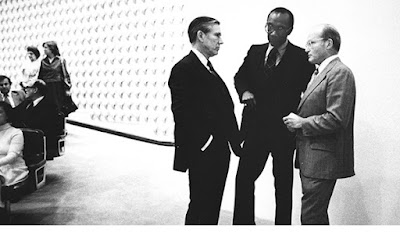Between 1932 and 1948, the New York Times newspaper claimed to always be providing its readers with accurate information about what was going on during the 1932 to 1948 period of world history. But between 1932 and 1948, the New York Times sometimes printed articles that turned out to be historically accurate; and sometimes also printed articles that turned out to be historically inaccurate.
In an October 19, 1945, headlined "Germans Indicted In Massacre Of 11,000 Poles In Katyn Forest," for example, the New York Times reported that "if the" July 1941 "crime was committed after the date when the Germans overran their last resting place it could not have been committed by the Russians" and "the Germans overran the Katyn Forest in 1941."
Then in a March 12, 1946 article, headlined "Pravda Denounces Churchill's Speech As Threat Of War," the New York Times reported that the then-Soviet Union's Pravda newspaper declared in an editorial:
"What does the proposal of Churchill come to? The formation of an Anglo-American military alliance that would assure Anglo-American rule throughout the world...and make a policy of force the dominant factor in the development of the world...
"...Churchill convulsively grabs for the coat-tails of Uncle Sam...in the hope that an Anglo-American military alliance would enable the British Empire, although in the role of a junior partner, to continue the policy of imperialist expansion..."
But in its October 16, 1946 issue, the New York Times printed an article about what eventually happened to some of the Nuremberg Trial defendants, following their convictions of war crimes and crimes against humanity, headlined "Goering Ends Life By Poison, Ten Others Hanged;" and which included the following names of the ten German war criminals who were hanged: "Joachim von Ribbentrop, former Foreign Minister; Field Marshal Gen. Wilhelm Keitel, chief of the German High Command; Ernst Kaltenbrunner, head of the Gestapo; Alfred Rosenberg, Minister for Occupied Territories; Hans Frank, who led in the killing of thousands of Poles; Wilhelm Frick, former Minister of the Interior; Julius Streicher, leader of Nazi anti-Semitism; Fritz Sauckel, director of the German General Staff; Col. Gen. Alfred Jodl, head of the German General Staff; and Arthur Seyss-Inquart, who sold out Austria..."
And in a December 12, 1948 article, headlined "Tojo And 6 Others Hanged By Allies As War Criminals," the New York Times listed the following names of the Japanese war criminals who were hanged: Hideki Tojo, former dictator of Japan; Koki Hirota, former Premier of Japan; General Kenji Doihara; General Iwane Matsui; General Akira Muto; Seishiro Itagati, former War Minister; and General Hitaro Kimwa. (end of article)
Gaza Flotilla Attacked By Drones
1 day ago












